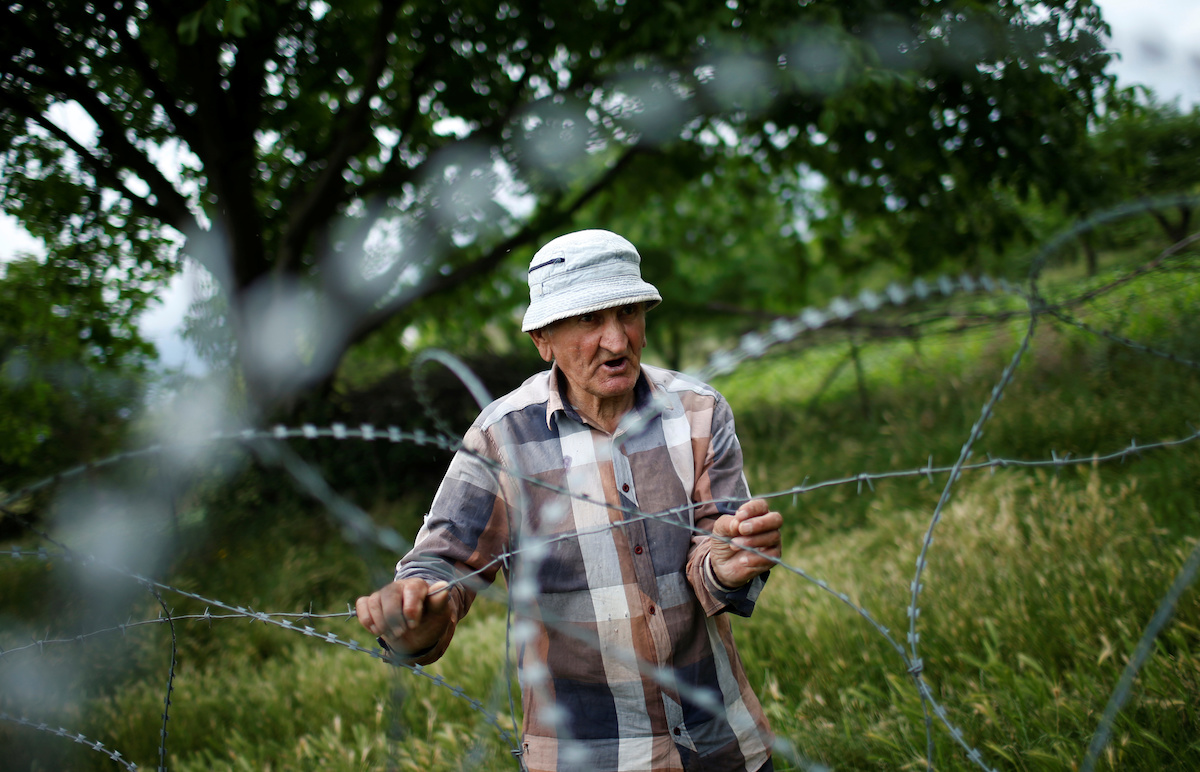Georgian woman detained in Tskhinvali allegedly beaten
Maia Otinashvili, a Georgian citizen who was detained near the occupation line between Georgia and South Ossetia is currently being held in a Tskhinvali prison.
The woman was arrested near her home by Russian military officers on 29 September while harvesting nuts on her property.
Galina Kelekhsaeva, Otinashvili’s mother, claimed in an interview with Radio Liberty that her daughter was beaten.
The Georgian Security Service reports that Otinashvili is being held for a pre-trial detention period of 10-days in the Tskhinvali prison.
However, the press service of the State Security Committee of South Ossetia (KGB) has earlier reported that she will be detained for a period of two months. The statement published on the South Ossetian KGB’s Facebook page also states a two months detention period.
This is not the first case where Russian military officers have detained a Georgian citizen in the conflict zone for trespassing the “border”.
As a rule, those detained for “illegal border crossing” are charged a fine and soon released.
The Otinashvili case is different, however, as the South Ossetian security committee claims that she profited from leading people across the border, for which she will be tried on criminal charges.
Kelekhsaeva, who is a member of the NGO Women’s Movement for Peace, calls the charges absurd.
In her interview with Radio Liberty, Kelekhsaeva claimed that her daughter was not allowed a single visitor, including family members and Red Cross representatives.
Kelekhsaeva says her daughter is being hidden because she was beaten. The mother claims that Otinashvili resisted arrest, and was beaten as a result. Kelekhsaeva does not rule out that the beatings might have occurred in the Tskhinvali detention centre.
“They are currently waiting for the marks of the beatings to subside. This is why they are not releasing her and have drummed up these absurd allegations,” insists Kelekhsaeva.
Georgia’s Human Rights Defender has released a statement saying that Otinashvili was kidnapped by people wearing masks. Witnesses say that the incident took place on territory under the control of Georgian authorities, approximately 50 metres away from the barbed wire division line.
Members of the Otinashvili family regularly visit this part of their private plot, but have never had incidents similar to this.
Also on this topic: New Khurvaleti – IDP’s call 139 cottages home. How do they manage?
The Prime Minister of Georgia, Mamuka Bakhtadze, commented on the detention: “The relevant government departments are working around the clock to return our citizen to her children and her family as soon as possible.”
He further said that all international resources were being utilized as well.
“The occupation regime continues its aggressive policy and is ignoring human rights,” added Bakhtadze.
Also from JAMnews: Georgia’s prime minister says “Russian-occupied Abkhazia and South Ossetia are on the brink of a humanitarian disaster” in his UN address
_____________
Khurvaleti is a village situated in the Gori district bordering the South Ossetian conflict area, 20 kilometres from the city of Gori.
Khurvaleti has especially suffered from “borderization”, a process in which Russian forces install barbed wire, effectively dividing an area.
The barbed wire in Khurvaleti has split the village in two: one side remains under Georgian control, while the other is controlled by Russian and South Ossetian security forces.
Also at JAMnews: What is life like in villages divided by barbed wire? A report from the conflict zone
Following the 2008 August War, the Russian forces who were deployed in the conflict area began to install signs reading “State Border” and “South Ossetia” along the administrative border line, including barbed wire.
The Russian and Ossetian sides call this process “borderization”, marking borders based on old, pre-war Soviet maps. They say that the “state border” is marked in such way that all the villages in the Akhalgori district fall under South Ossetian territory.
The Georgian side calls this process a “creeping annexation” and claims that the Russian side continues to annex new Georgian territories.
The barbed wire is often installed in such a way that villages are split in half. As a result, pastures, cemeteries and land plots belonging to numerous families end up on the other side of the “border”.

Movement across the so called “state border” is tightly controlled by Russian forces. They continue to detain people, including in places which do not yet have barbed wire or signs delineating the “border”.
There is often news in the region of Georgian citizens being arrested or detained for “border crossing” while they tend to grazing cattle or forage for food in a nearby forest.
The most recent incident took place at the end of August, when Russian forces detained five young Georgians on a hike in Truso Gorge. It took several days and the involvement of numerous international organizations to return the young people. Detainees are usually taken to the Tskhinvali detention centre and are freed when their fines are paid.
In addition to the Russian forces, the conflict area is also patrolled by EUMM (European Union Monitoring Mission) monitors. The EUMM has been patrolling the side under the control of Georgian authorities since the conclusion of the August 2008 war.




















